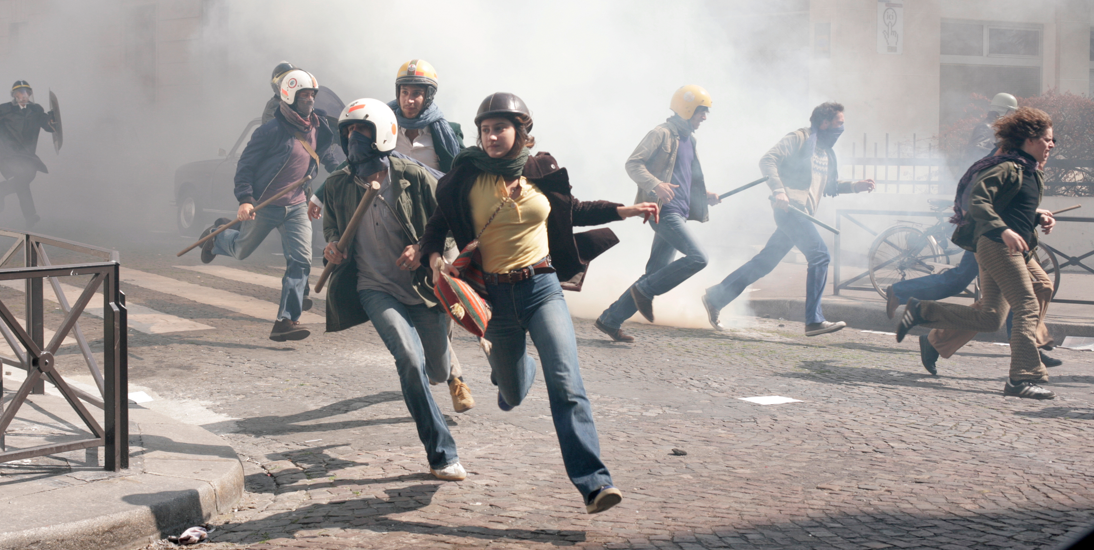Something In The Air, or Après
mai, the film’s original French title and the one that still appears
onscreen, is a semi-autobiographical look at groups of left-wing student
revolutionaries in 1971. Too young for May 1968, they came of age at the right
time to partake in the resulting counterculture.
The film begins not far from
Paris, where a group of high school students join protests, write and
distribute pamphlets and get severely beaten by a hardened police force that is
not willing to let the spirit of May 1968 return. The film primarily follows
Gilles (Clément Métayer), Christine (Lola Créton) and Alain (Félix Armand) as
they navigate through a revolutionary counterculture, each trying to find a
defining standpoint from which to weather a dark future.
Early in the film, these
protagonists attend an activist meeting in which it is discussed whether or not
to help out an apolitical victim of police brutality. To be apolitical is to be
self-centred, to accept fascism by apathy. Aside from the film’s realistically
rendered time capsule feel and in its full-blooded representation of the drugs
and psychedelic music of the time, the main signifier that the film is not set
in the present is the determinedly political and revolutionary students. The
film does not judge these characters – and it refreshingly avoids empty labels
such as “bourgeois idiots” or “insincere potheads” – nor does writer-director
Oliver Assayas blindly eulogize, preferring that the viewer either see
themselves in the characters or reject them outright for their sins.
The actors are fantastic in the
way of Robert Bresson’s blank slate, portraying determined people open to life
rather than character development plot points which would merely seek to
categorize each into the “determined but blind” or “doesn’t know what they
want” box. They seem like people who were there in 1971, who inhabit their
retro costumes and fit in around the furniture, surely an achievement in
itself. Best of all, they play their difficult roles with honesty and humanity
– they do some disturbing things but they are also passionate, artistic and
genuinely interested in making the world better. Assayas, keeping the
Scorsese-like grandiose shots to a minimum, focuses on his characters, staying
close to them so that the film does feel human alongside all the political
rhetoric and violent revolutionary activities.
What the film does best is its
ability to invest such importance in what is essentially an adolescent rite of
passage film, with principles and disillusionment standing in for the usual
innocence and romance versus reality. Assayas focuses as much on the
characters’ burgeoning artistic capabilities as he does on their political
education. Gilles is a painter as well as an activist, the two being of equal
importance and far from mutually exclusive. A debate about political cinema
ultimately results in the break-up of a romantic relationship since diverging
opinions represent diverging personalities. Being non-judgemental, Something
In The Air is not really a political film but it is a film that depicts a
political time and a fiercely political group of people. However, Gilles
approaches his painting, his reading, his work, his romance and his politics
all with the same deeply personal dedication. Politics does not set him apart;
it merely is a part, changeable but irreducible. As a result, these characters
don’t only seem to be fully realized and three-dimensional, they also seem to
be real people with a range of interests and preoccupations. As a result, Something
In The Air becomes less a film about revolution and more a film about
people who want revolution. And this leads us to the film’s main flaw.
It is difficult to imagine Something
In The Air causing someone to rethink their opinions or, even, appealing to
someone who was not already interested in student revolutionaries. It is a film
that is meaningful and important to some of us, but would surely be too easy for
others to dismiss outright. Assayas is being nostalgic and the primary impetus
for the film was most probably his own wish to revisit his past. And a
fascinating past it is too, but it is difficult to imagine the film having
anything to say to someone who wasn't already fascinated by how far the
revolutionaries of 1968 came, what Godard made of the problem of making political
films politically, the difficulties of embracing Mao following the massacres
behind the Cultural Revolution and, more generally, the counterculture that
became more and more normalized. In this sense, the film is like Ken Loach’s The Spirit of ’45, interesting and important but too easily dismissed by the
naysayers.
However, this flaw is minor and
ultimately defensible since the May 1968 revolutionaries and the characters in
this film do not tailor their politics to appeal to the masses. A version of Something
In The Air that would appeal to the apathetic or the ardently right wing
would obviously be a diluted film which would hardly work for those who feel
closest to it. So, accepting that it is ineffective and narcissistic, Something
In The Air remains an important and powerful film.
Something In The Air is a film about young people who are not perfect but
who are determined to sort out the world – a perfect antidote to the horrible
and much more audience-friendly Zero Dark Thirty. To watch it is to
realize how dead the left-wing movement is, but also how vital it was.
Otherwise it is a great time capsule and a fantastic character study.

No comments:
Post a Comment